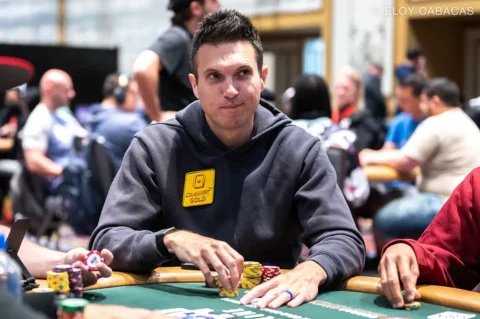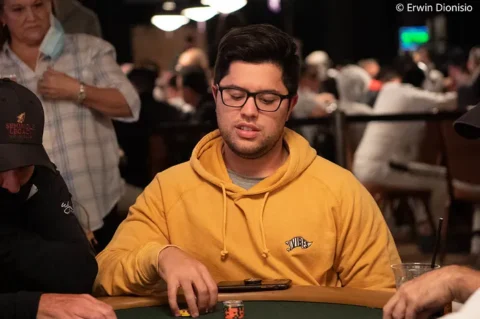Poker House Rules are a part of just about any real money poker game. They serve as a list of DO’s and DONT’s for players who are competing within a hosting venue, and can be very broad depending on the game variant, stakes, and format.
Whether you’re competing in a poker game within a five-star casino or playing in a poker home game among friends, the poker house rules are important and should be followed at all times.
In this article, we’ll take a look at some of the different types of rules that can be implemented in real money poker games while also explaining why they’re used and how they may vary for each individual poker room.

Poker House Rules – Common Themes
Following are a handful of common themes that you’ll find when reading the house rules for poker at most venues.
Bad Beat and High Hand Jackpots: Do Not Collude
I put this one first because there have been multiple, high profile instances over the years in which players have been denied a Bad Beat or High Hand Poker Jackpot due to one or more players at the table not following the rules during the course of the hand in question.
The result can be excruciating (and even controversial) for all players at a Bad Beat Jackpot table, especially when all players who were dealt into the hand would have been eligible for a share of the jackpot prize.
If you are playing at a venue that offers one of these types of prizes for high hands or bad beats, then do NOT attempt to collude and/or tip-off others at the table that you are in possession of a very strong hand.
You should play the hand out as your normally would in any other competitive poker environment, and you must ALWAYS bet, raise, or re-raise the best possible hand on the river IF the poker house rules demand it.
There may also be stipulations, depending on the hosting venue, that automatically disqualify a Bad Beat Jackpot hand.
One example of this is when the community board is already showing a very high hand. Be sure to review the poker house rules for jackpot prizes, as bad beat and high hands may require players to use one or two hole cards minimum in order to complete their respective hands.
Cards That Touch the “Muck” Are Automatically Folded
If you’re a player who is concerned about cards being unintentionally turned over or folded by the dealer, then you might want to look into purchasing poker card guards.
This is because many casino and card room venues will automatically declare your hand “dead” (folded) if one or more of your hole cards physically touch the “muck” area that’s designated for discards.
Even if a dealer accidentally takes your cards and places them into the muck, your hand will still be declared as folded according to almost all poker house rules.
Voiced Betting Round Actions Are Enforceable
Another very common house rule for poker games is that any betting action that is audibly voiced by a player (such as “check,” “bet,” “raise,” “re-raise,” “fold,” and so on) is considered to be binding.
Be very careful that you don’t audibly declare that you’re making a certain betting action when playing in live, real money poker games.
The reasoning behind this rule is to disqualify players who may audibly call out an action, hoping that it will be non-binding, just to see if they can obtain one or more poker tells from an opponent once the words are said out loud.
Players Must Continue (on the River) When Holding the Best Possible Hand
I mention this rule because there have likewise been a few high profile cases that have caused controversy.
At some (but not all) poker venues, the house rules will specifically state that players are NOT allowed to “check to showdown” or “call” on the river with the best possible hand — in accordance with poker hand rankings — unless the call is being made in reaction to an all-in bet or a max-capped re-raise.
Again, the reasoning for this rule is to avoid collusion between two or more players, or to ensure that Bad Beat Jackpot or High Hands eligible for an extra prize are played out to its natural conclusion.
Here’s a sample hand to illustrate this rule:
PLAYER 1: Qc-Jc
PLAYER 2: x-x
COMMUNITY BOARD CARDS: 8c-As-9c-Ah-Tc
In this example, Player 1 has the best possible hand: a Queen-high Straight Flush — Clubs.
There is no other hand that can possibly match Player 1’s hand at showdown.
Many poker house rules will require Player 1 to continue betting with the best possible hand. What this means, exactly, is that Player 1 can NOT be the individual who ends the hand (being last to act) via a “check” or “call” unless the opposing player(s) are all-in with no other option than to call.
Note that Player 1 CAN opt to check or call a bet as long as Player 1 is NOT the last person to act in the hand.
Don’t Talk About Your Folded Hand While The Hand is Still in Progress
Folding a hand in poker and then subsequently talking about it — while the hand is still in progress — is very much frowned upon in any competitive game. This includes reacting to community board cards as they are dealt.
Be respectful of other players at the table who are still competing for real money in the hand.
In extreme cases, revealing (or hinting at) the hand you folded in poker can get your thrown out of a game, or barred from the venue altogether.
Restriction of Connected Mobile Devices in Live Poker Games
The advent of televised poker games has led to some high profile venues banning the use of connected mobile devices at the table.
While this poker rule may be somewhat common for streamed, televised competitive poker games, it’s not all that prevalent at your local casino or card room games.
Some players may insist on being able to have their connected mobile device at hand when playing in a real money poker game, and there’s not all that much that hosting venues can do to enforce a ban unless the poker event itself is extraordinary in nature.
Near the dawn of the handheld mobile device age, many casinos — not only in the U.S. but throughout the world — attempted to enforce rules to collect mobile phones before allowing entry to a venue.
However, as smart device use became more commonplace and more indispensable to individuals, casinos and card rooms were forced to allow customers to enter with their mobile devices or lose business.
Poker House Rules for Private Home Games
Private home games may have VERY different poker house rules compared to what you’ll find at casinos and card rooms.
Whether you’re participating in a casual, low stakes poker home game or a serious high stakes game, you might find that there are a few unwritten rules that are unique to that specific venue or home game player group.
Some of these rules may include:
- Players must bring food and/or beverages to the venue
- Alcohol, drugs, and firearms may be outright prohibited
- Players must bring a minimum/maximum buy-in amount with them
- Players may not “quit” the game before the regularly scheduled time to do so
- Players can not bring a friend with them into the gaming area
- Players must bring a poorly-skilled poker player with them in order to participate in the game
As with casino and card rooms, the poker house rules in private home games can vary greatly from one venue to another.
Are Poker Home Games Legal?
The answer to this question depends entirely on the geographic or political jurisdiction in which the home game is taking place.
Generally speaking, you’ll want to keep any poker home game that you’re hosting at minimum stake levels to avoid foreseeable issues that might arise from such an activity.
There may also be a number of liabilities that you open yourself up to when hosting a poker home game, especially is alcohol or drugs are consumed while you’re hosting.
Mainly, the best poker home game is one that restricts the presence of firearms altogether while also banning the use of drugs and alcohol. Even if you arrange for transportation from your venue when a player is too inebriated to drive, you can still be in big trouble if that person engages in criminality after arriving at their home or hotel room.
One other thing to be on the lookout for when running and/or hosting a home game is to NEVER allow players to compete in real money games on credit. Doing so is a sure-fire way to expose yourself and other payers to non-collection. Or, in cases that you ARE able to collect, allowing players to play on credit may place you smack-dab in the middle of a civil dispute that revolves around problem gambling and intervention.
While the amount of local and state jurisdictions makes it impossible to provide a comprehensive list of precisely WHERE home games are legal/illegal, a good rule of thumb when hosting a home game is simply to keep the stakes super-low and the environment super-casual.
Uncommon Poker House Rules
There are a few uncommon poker house rules that may be implemented in extraordinary scenarios, namely when a casino or card room is allowing player-promoters to operate a high stakes private game on-site.
Usually, these games will require players to place their names on a waiting list and provide personal info before becoming eligible. In some cases, the restrictions might be fleshed-out to a point where the game host will NOT allow any player to participate in the private game regardless of that individual’s placement on a waiting list.
These private games that are hosted within major casino venues have become a point of controversy, as they tend to attract poorly-skilled “whales” who would otherwise be feeding into “reg-pro” economies.
However, most casinos are private property, and the activities that take place on a casino’s premises are usually determined and authorized exclusively by casino personnel and regulatory bodies.
Even if you’re unhappy with a private poker game being allowed at a casino, there’s not really much you can do about it since a casino usually enjoys sole discretion over what is/isn’t allowed on their property.
Making a List of Poker House Rules
If you’re thinking of participating in a poker home game (or hosting one), it might be a good idea to make a list of the house rules that will be enforced while competing at the tables.
Make sure you know the rules of popular games like Texas Hold’em and Omaha before committing any real money in a competitive environment. You definitely do NOT want to be competing for real money in any poker game that is foreign to a point that you’re not familiar with the basic rules of how to play.
If you’re playing novelty poker variants such as Stand Up Poker or Indian Poker, you’ll want to be acutely aware of any poker house rules ahead of time so that you don’t make a mistake that disqualifies your from a hand.
Note that there are also several casino-style card games that may have rules that have nothing to do with how competitive poker games are played.
Games like Double Draw Poker, Blackjack, Caribbean Stud, and others do not fall under the category of PvP (Player versus Player) activities. Instead, there is a “house edge” in these games that the casino or hosting venue will enjoy over players.
Make a list of poker house rules that are necessary to remember and always keep them in mind when competing at the tables to ensure you don’t miss out on any opportunities to win big or even collect a Bad Beat Jackpot!














